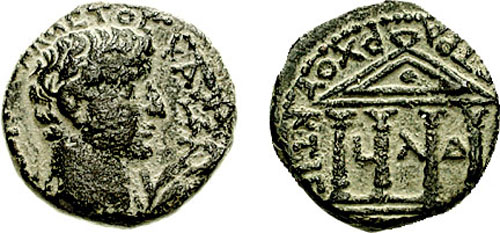Which Side Are You On?
Posted on Thu 09 September 2021 in Preaching
The Revised Common Lectionary for Proper 19B assigns the reading Mark 8:27-38, referred to as the Confession of Peter:
Jesus went on with his disciples to the villages of Caesarea Philippi; and on the way he asked his disciples, “Who do people say that I am?” And they answered him, “John the Baptist; and others, Elijah; and still others, one of the prophets.” He asked them, “But who do you say that I am?” Peter answered him, “You are the Messiah.”
Both Matthew 16:13 and Mark 8:37 name Caesarea Philippi as the location of Peter's confession. The naming of the place is more than just an establishing shot. The story of the city itself provides a setting that lifts up Peter's confession about Jesus to a radical place.
Amy-Jill Levine notes in The Jewish Annotated New Testament that Caesarea Philippi was "originally Panion after the god Pan, to whom there was an important cult site, was re-founded under Herod's son Philip, who renamed it in honor of the emperor and himself. A major temple, probably dedicated to the emperor, has been discovered nearby" (p. 77).
This is the same Philip the Tetrarch named in Luke 3:1, often read at Christmas. The name Caesarea Philippi is Latin, meaning "Philip's Caesarea." This distinguishes it from Caesarea Maritima, build by Philip's father, Herod the Great, on Israel's Mediterranean coast. Caesarea Maritima, as one might expect from a place named after Caesar, was the seat of Roman control after Judea became a province in 6 AD.
Naming a city after Caesar is clear indicator of loyalty to one's imperial occupiers. Further naming it "Philip's Caesarea" indicated that the Tetrarch wanted to make himself known as a quisling, ready personally to collaborate with the colonial power. After all, he ensured the building of an imperial temple so that Caesar could be literally worshiped.
All of this happened around 14 AD, during the teenage years of Jesus and his followers.
Further, Caesarea Philippi was the seat of power for a tetrarch. The city itself was able to mint coins for the region. By 30 AD, near the time of the Mark 8 story, Philip was bold enough to put his own image on the coins:
 *Source: Wikimedia Commons
*Source: Wikimedia Commons
The coins on one side name "August Caesar" and the other "Philip the Tetrarch." In a first for Jewish rulers, Philip put his personal image on the coin. Of course this would be a scandal to the Jewish people using the coins. Again the image of Caesar and Philip together demonstrates the strength of the pact between colonizer and colonized.
This is the place where Jesus brought up the question of his identity to his followers. Many preachers urge their listeners to identify with Peter in a personal faith statement. Jesus asks, "Who do you (individually) say that I am?" The right answer is that Jesus is the Messiah who saves and redeems. Peter's personal answer should be our personal answer and commitment to Jesus too.
I've preached this myself and won't argue against this use of the passage.
Jesus asks this question in the seat of power of Philip, the imperial quisling anxious to show his Roman bona fides. The disciples are in the city and region passing around coins with Philip's face on them, showing his betrayal of his people, religion and culture. Perhaps Jesus knows that Philip is among those who would lose his soul to gain the world (or at least a tetrarchy).
Jesus asks this question not in the singular, but in the plural, "Who do y'all say that I am?" Aimed at the body of followers, Mark uses the term Messiah or Christ for the first time since 1:1. Coming from Peter and all of Jesus' followers, "You are the Messiah." And not only a Messiah who can save our souls but the Messiah who can save the very real world around them.
In Philip's city of imperial collaboration Jesus' question takes on the tone of the labor union and civil rights song, Which side are you on?
In the words of Ched Myers in Binding the Strong Man:
Peter's answer is far more momentous: it introduces into the story world for the first time the politically loaded term "Messiah" (Christos). Jesus is not simply a great prophet; he is a royal figure who will restore the political fortunes of Israel. The revolution, Peter is saying, is at hand (p. 242).
The question of personal faith in Jesus is an important one but the setting of Caesarea Philippi opens up new dimensions of the radical work of Jesus that can bring salvation not only for the next world but for this one too.